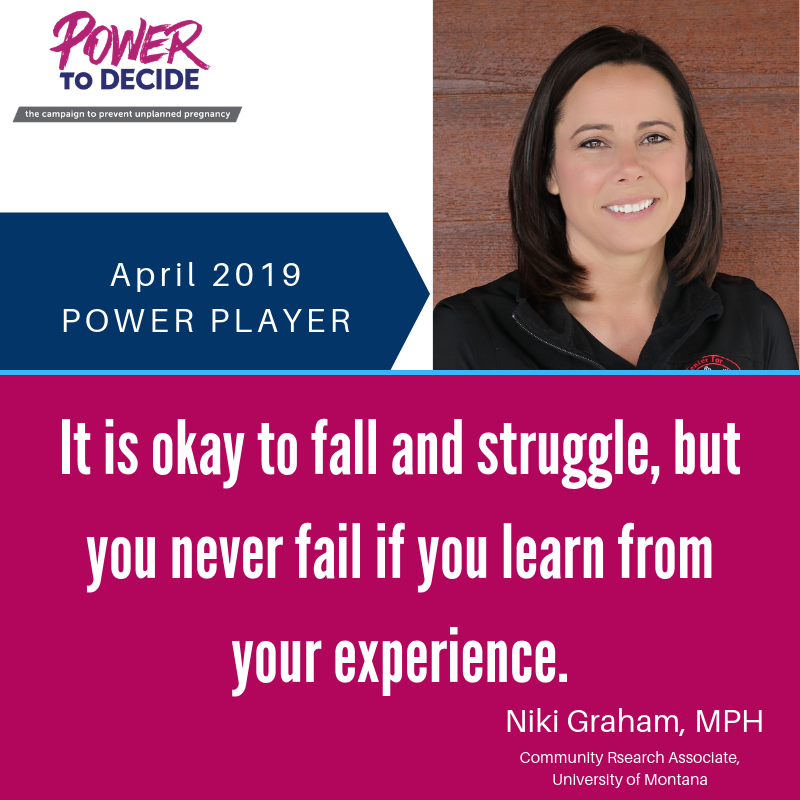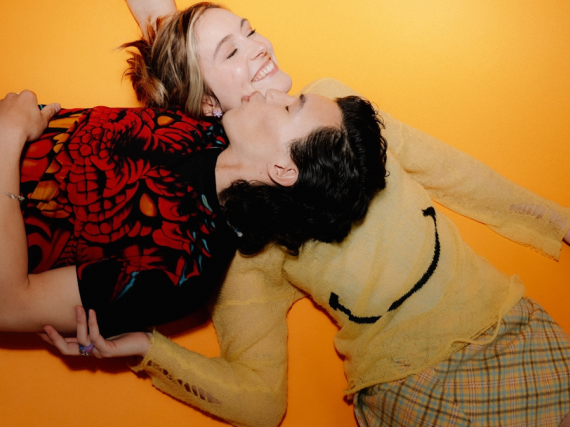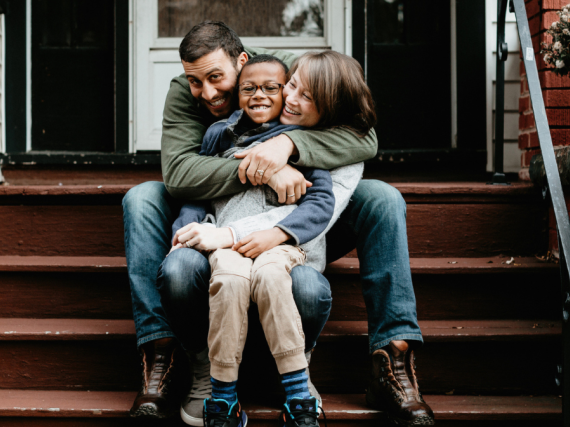April 2019 Power Player
Here at Power to Decide, we are committed to uplifting the many individuals who are on the ground doing the work that matters most. Each month we highlight an individual or organization who is championing the effort to give young people the power to decide if, when, and under what circumstances to get pregnant and have a child. Check out this month's Power Player profile.
Niki Graham, MPH
Community Research Associate at University of Montana - School of Public and Community Health Sciences
What work have you done to ensure that young people have access to high-quality sexual health information or high-quality contraceptive services so that they can decide if, when, and under what circumstances to get pregnant and have a child?
For the past 14 years, I have worked across all age groups within my community, giving various presentations on sexual health, reproductive health, HIV, and STIs. To reach the youth of a tribal community you have to receive the approval of the elders. By establishing trust with them and receiving their approval, the sky is truly the limit. Most recently, I’ve spoken to area high school students in their health courses. I may have a reputation as "condom lady" however, I leave a lasting impression on my participants with an interactive activity using chemicals to “infect” them diseases. I have fun with my presentations, but ultimately, my goal is to be an approachable adult that high school students can trust with their questions and count on for solid advice on how to navigate the health system.
How did you get started in your field? What is your driving force?
I studied Health Enhancement and have a K-12 teaching certificate. I've always wanted to work in the health field, but it wasn't until my third year in college that I decided not to become a physician. I wanted to teach people to be healthy, not see them as they died. I changed my major and became an educator. I taught in Montana and Nevada for 5 years before returning to my home reservation in Montana in 2004. When I returned home, I couldn’t find a job in any area schools and applied for a position with our tribal college, Salish Kootenai College. As the only applicant who knew how to define HIV, I got the job. While funded completely by grants, I learned to survive on a little from funders across our nation. I became the Director of the Center for Prevention and Wellness where I still serve as a mentor and co-coordinator of the largest health fair in our region.
Internally, my driving force is the health of our youth. In my community, we struggle with substance use, suicides, lack of family structure, loss of traditional ways, and cultural togetherness, on top of poverty. People are trying to survive, yet we don't always provide the proper tools for survival. I hope that I'm a tool that people trust and will remember as they go on their journey.
What advice would you give to someone looking to effect change in the field that you currently work in?
My advice to someone looking to create a space for positive change is to be patient and get the right people involved. You may get tired and want to give up at times, DON'T! You need to build your community by identifying people who will hold you accountable and offer accolades as you grow and learn. It is okay to fall and struggle, but you never fail if you learn from your experience.
Why should someone care about ensuring that all people—regardless of who they are or where they live—have access to the information and contraception they need to live their best life story?
Visit the communities I work in and look around. If parents had access to services, information, and contraception, how many of our struggles would exist? The community knows and understands, but again . . . they are trying to survive, and personal health is not a priority compared to keeping a roof over your head or filling your stomach.
I do believe we need creative messages to reach youths. It’s a new skill set that many public health employees are completely blinded to. There is a strong need to better understand our future generations and the technology they have at their fingertips.
Is there a highlight of your work in conjunction with our organization that you’d like to share?
I feel like I have the best job in the world. I create and sustain relationships with community members, tribal leadership, and academia while raising my children and maintaining a 23-year long marriage. I believe my role as a Community Research Associate allows tribal communities the opportunity to see the future and to address daily struggles while working towards a healthier community for generations to come. I'm not perfect, but I know that I make an impact when I'm approached by our tribal elders and thanked for the work I do. I wouldn't be able to do the work I do without amazing support from the University of Montana School of Public and Community Health Sciences.



